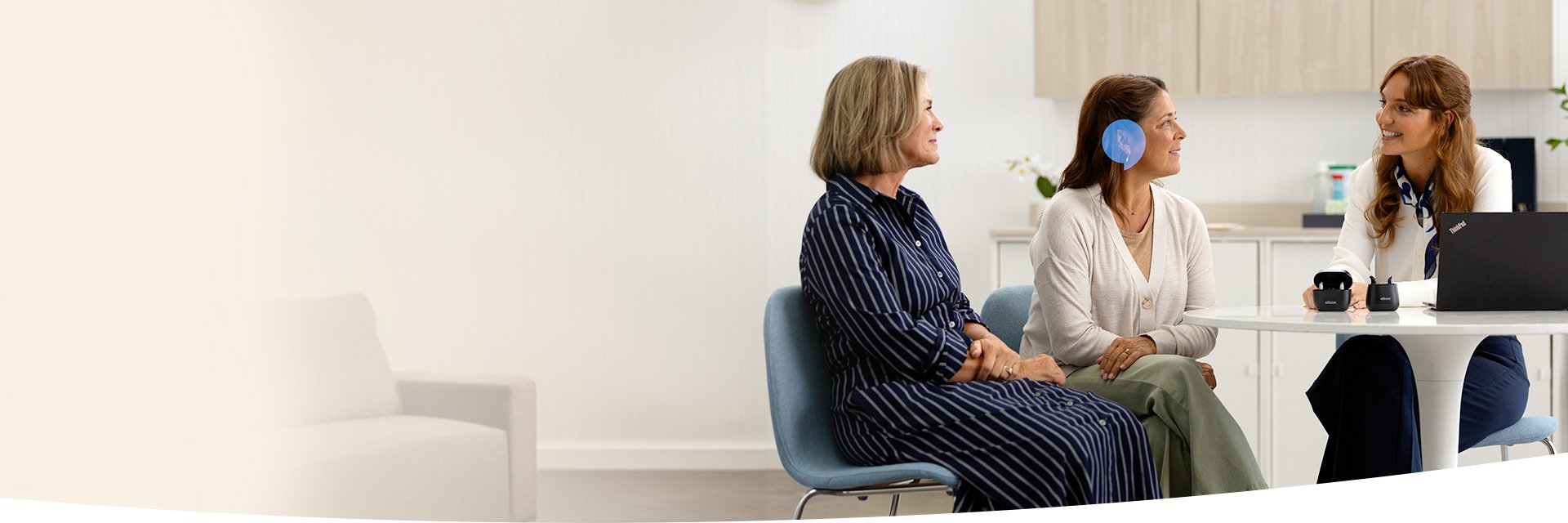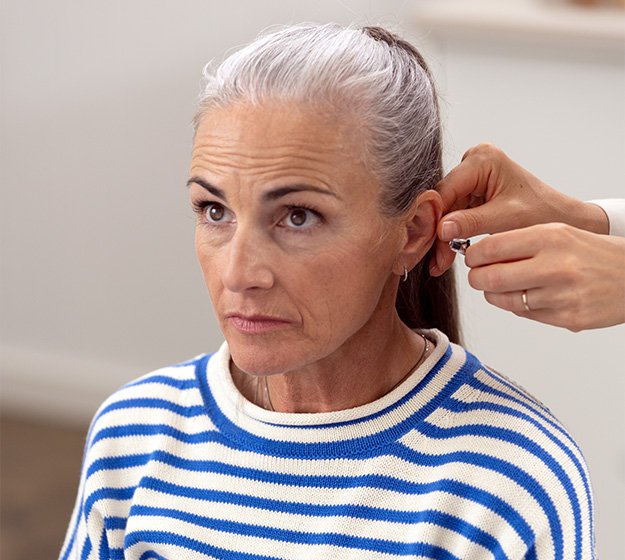Hearing loss

6 signs and symptoms of hearing loss
The symptoms of hearing loss depend on the type, degree and cause of hearing loss.
If you recognise any of the below symptoms, we recommend getting a FREE* hearing check at a hearing clinic near you.
Do you recognise any of the above signs of hearing loss?
If you or someone you know can relate to any of the signs of hearing loss listed above, then it may be an indication of hearing impairment, and you should get your hearing checked.

Book your FREE* hearing check today
Complete the steps below or quote the 'Audika' website when booking your appointment. All fields required.
Degrees of hearing loss
The degree of hearing loss refers to the severity of the loss and is generally categorized as either mild, moderate, severe, or profound
It can be measured in decibels (dB), referring to how loud sounds need to be for you to hear them.
Types of hearing loss
Sensorineural hearing loss
The most common type of hearing loss is called sensorineural hearing loss. It can be caused by damage to tiny hair-like cells in the inner ear or damage to the auditory nerve. Often, this type of hearing loss can be managed with hearing aids.
Conductive hearing loss
This type of hearing loss comes from a mechanical problem in the middle or outer part of the ear. Conductive hearing loss can also be caused by an obstruction of some sort in the canal of the ear, such as earwax preventing sound from getting to the ear drum. It can be treated and/or managed using hearing aids or other medical options.
Mixed hearing loss
Mixed hearing loss is when both aspects of sensorineural and conductive hearing loss are present.
What causes hearing loss?
Understanding the source of your hearing issues gives our professionals insight into your needs, so we can advise you with the best options for your specific treatment. That's why we encourage you to speak with our experts as soon as you notice any hearing difficulties.
Common causes of hearing loss include:
- Aging
- Excessive noise exposure
- Injury
- Viral infections (such as measles or mumps)
- Wax buildup
- Ototoxic drugs (medications that damage hearing)
- Genetics
Tip from an audiologist
No matter your level of concern, it is important to seek advice early when it comes to hearing loss.
The longer hearing loss is present the greater the impacts on your self confidence, relationships and health and the more life you miss out on!

Treating hearing loss
Hearing loss treatment and/or management may include: ear wax removal, hearing aids, surgery, cochlear implants or bone anchored hearing solutions.
The best solution for your hearing loss will depend on:
- Type of hearing loss
- Degree of hearing loss
- Cause of hearing loss
- Your budget
- Lifestyle, personal interests, cosmetic preferences and communication needs
4 steps to improving your hearing
How your hearing works
Hearing begins with sound waves entering the ear and ends with the brain interpreting them as meaningful sound. Tiny bones and hair cells work together to bring the world to life.
But hearing is more than mechanics - it’s how we stay close to the people and moments that matter most. Learn more about the different signs of hearing loss.
|
Audio |
Visual |
|
Music |
How hearing works Audika Logo
|
|
Music |
The ear consists of 3 parts
The outer ear
The middle ear
The inner ear
Image of an ear |
|
Music |
Sound waves are captured by the auricle/pinna and travel through the ear canal
Auricle/Pinna The visible part of our ear
A zoom on the outer ear |
|
Music |
Sound waves cause the eardrum to vibrate and sends those vibrations to the 3 tiny bones in the middle ear called malleus, incus and stapes
Sounds waves passing on through the middle ear.
Malleus, incus and stapes are identified in the middle ear. |
|
Music |
The malleus, incus and stapes help amplify sound vibrations, sending them to the inner ear (cochlea).
Malleus, Incus, Stapes remain identified.
The cochlea is identified in the inner ear. |
|
Music |
Vibrations activate tiny hair cells in the inner ear, changing vibrations into electrical signals.
Image of a brain |
|
Music |
Auditory nerves send these electrical signals to the brain where they are interpreted as sound.
A woman sitting on a couch hearing the door bell ring. |
|
Music
|
A woman hugging a man at the door. |
|
Music |
Love your ears
Audika logo |

How to prevent hearing loss
While there is no cure for loss of hearing, there are steps you can take to prevent it and reduce your chances of developing hearing loss over the course of your lifetime.
Learn more about healthy hearing practices and protection solutions that may help reduce hearing loss.
FAQ about hearing loss
Disclaimer
^Applies to Demant hearing devices only (Oticon & Bernafon , excludes accessories.
~ Denotes most common dB classification used in clinics.
1 Hearing aid(s) and all accessories must be returned to Audika in an undamaged condition within the 90-day change of mind return period. If the hearing aid(s) are returned in a damaged condition, Audika may in its sole discretion retain payment of the hearing aid(s) and/or claim from you any outstanding balance on the cost of the hearing aid(s). The 90-day change of mind return period does not impact and is in addition to your statutory consumer law rights, and any product warranty offered with the hearing aid(s).









